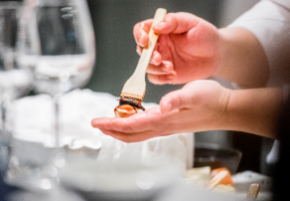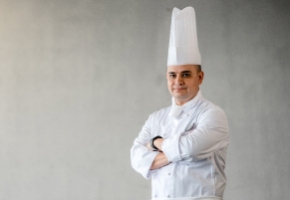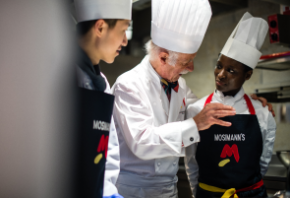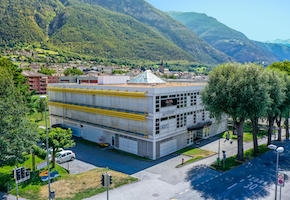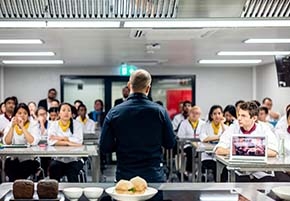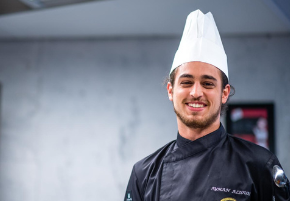- About
- Programs
- Campus Life
- Career Services
- Admissions
- News & Events
- Alumni
How to Become a Pastry Chef: Education and Experience
Learn how to become a pastry chef through hands-on training, skill development, and career tips to succeed in the world of pastry arts.
Key Takeaways
- Becoming a pastry chef requires formal culinary education, hands-on experience through internships, and specialized training in pastry arts to master both technical skills and creative presentation.
- Hands-on experience through internships at luxury hotels, restaurants, and patisseries is essential for developing real-world skills and industry connections.
- Specialization in areas like chocolate work, sugar artistry, or gluten-free baking helps pastry chefs build expertise and advance to leadership roles.
- Career opportunities include pastry chef positions, bakery ownership, and roles in product development or culinary education.
Pastries have always been part of life's meaningful occasions. They are present at birthdays, weddings, holidays, and family gatherings, adding a touch of celebration to the table. Even in difficult times, a well-made pastry can offer comfort and make a heavy moment feel a little lighter.
But while pastries are often eaten quickly, the work behind them is anything but simple. Preparing fine pastry requires exact measurements, careful timing, disciplined consistency, and technical mastery, where the smallest detail can determine the result.
Anyone can bake at home, but for those who aspire to create pastries at the level of a professional, the first step in understanding how to become a pastry chef begins with recognizing the discipline and dedication that this craft demands.
What Does a Pastry Chef Do?
Pastry chefs are culinary professionals who specialize in baked goods, desserts, and confections. While their craft is rooted in baking, the role also extends into leadership and management, requiring them to balance the creative side of pastry with the organizational and professional demands of running a kitchen environment.
Daily responsibilities
The role of a pastry chef is highly structured and depends on both technical expertise and creativity. Common responsibilities include:
- Baking and monitoring products to ensure consistency
- Decorating, garnishing, and plating desserts to professional standards
- Developing and testing new recipes to expand menus
- Planning dessert selections that align with restaurant or event themes
- Managing ingredient supplies and cost efficiency
- Maintaining hygiene standards in the pastry kitchen
- Training and supervising junior staff or apprentices
- Coordinating production schedules to meet service deadlines
Work environments
Because sweets hold a general universal appeal, pastry chefs can build careers in diverse settings, each offering distinct experiences and skills. They may work in:
- Fine-dining restaurants: Creating sophisticated plated desserts that complement tasting menus and seasonal ingredients
- Hotels and resorts: Managing large-scale breakfast pastry production and banquet desserts for hundreds of guests daily
- Cruise ships and luxury travel: Serving international clientele with varied dietary preferences while working in compact kitchens
- Bakeries and patisseries: Focusing on retail baked goods, seasonal specialties, and custom celebration cakes
- Catering companies: Designing desserts for weddings, corporate events, and special occasions with unique presentation requirements
How to Become a Pastry Chef
Natural ability can be valuable, but becoming a professional pastry chef requires more than talent. You must learn fundamental techniques, build a working knowledge of food science, develop creativity in presentation, and gain exposure to professional kitchens that demand discipline and consistency.
Professional pastry work is very different from baking at home. Commercial environments require exact precision, the ability to maintain quality across large volumes, adaptability when conditions change, and consistency under pressure. This level of expertise is best developed through structured education in culinary schools and reinforced by practical experience in internships.
Start Your Culinary Journey
Learn the art of cooking in a world-class environment
1. Get a foundational education
Every pastry chef begins by mastering the basics. Before innovation can happen, there has to be an understanding of why certain techniques work, how ingredients interact, and what professional standards look like. Sometimes that means listening and observing before trying things yourself, although the strongest schools ensure that theory is always paired with practice.
At Culinary Arts Academy Switzerland (CAAS), students handle both theory and practice from the beginning by learning concepts in the classroom and applying them in professional kitchens.
Fundamental knowledge includes mixing methods, temperature control, timing, and ingredient science, along with essentials such as food safety, sanitation, cost awareness, and classical preparations. These skills provide the framework on which advanced creativity is built.
Akshay, a CAAS alumna who transitioned from engineering to pastry and chocolate, explained her own decision clearly:
Since I knew I had to acquire knowledge from the very best, I enrolled at Culinary Arts Academy to study Swiss Pastry & Chocolate Arts.
That foundation allowed her to build confidence in her new profession and eventually launch her own venture, SIHI Chocolaterie.
The Swiss Diploma in Pastry Arts at CAAS is designed for exactly this purpose. Over the course of one year at the Le Bouveret campus, students progress through modules in European pastry essentials, chocolate, dessert styling, nutrition, and specialized diets, while also studying French or German.
Beyond technical training, CAAS provides access to professional-grade kitchens, instruction from chef-instructors with real industry experience, and direct connections with employers. The investment in this type of education supports long-term career growth by giving aspiring chefs both confidence and credentials.
2. Gain hands on experience
Real-world kitchen experience is essential for building speed, consistency, versatility, and professional judgment under pressure. Aspiring pastry chefs should pursue multiple kinds of practical experience.
Internships and externships are one of the most valuable tools, offering exposure to high-volume production, strict professional standards, and real-time decision-making. Entry-level positions, such as pastry cook or assistant, allow close observation of experienced professionals while gradually building confidence in demanding kitchen environments. Diverse experience across hotels, patisseries, and fine dining develops a broader skill set and reveals how pastry adapts to different service models.
At CAAS, students complete a six-month internship after their second term, either in Switzerland or abroad, which provides both international exposure and credibility. Some alumni have secured internships at renowned properties such as the Mandarin Oriental in Geneva, the Grand Hotel Les Trois Rois in Basel, or the Dorchester Collection's Le Meurice in Paris. Many secure placements through the International Recruitment Forum (IRF), where employers from around the world come to Switzerland to interview CAAS candidates directly.
Alumni experiences reinforce the value of this training. Vinayaka, now Co-Founder and Executive Chef at Sweet Sugar Bakery, reflected: "My favorite memory at Culinary Arts Academy is the hands-on experience I got working in a professional-level kitchen with professional chefs."
Another alumna, Maitha, described the value of guidance during her studies: "I believe that the school is helping us build our future and guides us on where to do our internships to gain the most experience. With their great chefs and instructors, they give us all we need to get the most out of our university experience."
These experiences highlight why structured support matters. Students are taught the skills, shown how professional kitchens operate, and then guided into placements where they can practice effectively, rather than being left to adapt without preparation.
3. Consider professional certification
Specialization helps pastry chefs stand out in competitive markets and creates pathways to distinct career opportunities.
- Chocolate and confectionery: Mastery of tempering, molding, decorative techniques, and large-scale chocolate sculptures.
- Sugar artistry: Techniques such as pulled sugar, blown sugar, and pastillage for showpieces and competitions.
- Bread baking: Advanced fermentation, scoring, and artisan bread production as demand for specialty bakeries increases.
- Dietary accommodations: Expertise in gluten-free, vegan, or allergen-sensitive pastry, responding to modern dietary needs.
- International specialties: Regional techniques from French patisserie to Italian gelato and Japanese wagashi.
Although specialization can develop naturally through professional environments, structured programs provide a more systematic way to refine advanced skills and prepare for highly competitive roles.
4. Specialize your skills
Advancing in pastry requires more than technical mastery. Supervisory and senior roles demand broader knowledge that blends management, creativity, and financial awareness.
Key areas include:
- Team leadership: Guiding, motivating, and training staff across different skill levels.
- Menu development: Designing seasonal and profitable menus while balancing creativity with efficiency.
- Vendor and supplier management: Building reliable relationships to secure high-quality ingredients and control costs.
- Financial oversight: Monitoring budgets, portion sizes, and waste reduction to protect profitability.
- Trend awareness: Keeping pace with dietary shifts, new techniques, and evolving guest preferences.
Programs that combine culinary expertise with business education, such as a BA in Culinary Arts, give aspiring pastry chefs the tools to move to supervisory and leadership positions. These programs teach students the business aspect of party arts alongside advanced pastry techniques. The blend guarantees graduates are as skilled in running departments or even their own businesses as they are in the kitchen.
5. Advance to higher level roles
Career progression in pastry typically follows this path:
- Pastry Cook/Assistant: Focused on mastering basic techniques and understanding kitchen operations.
- Junior Pastry Chef: Managing specific production areas or sections of a menu.
- Pastry Chef: Overseeing a department, planning menus, and supervising staff.
- Executive Pastry Chef: Directing entire pastry operations, training programs, and long-term strategy.
Alternative pathways also exist for those who want to branch out:
- Food styling for media and advertising.
- Culinary education as an instructor or trainer.
- Product development for major food brands.
- Entrepreneurship through opening a bakery, chocolaterie, or catering business.
Why Choose a Swiss Pastry Education
Switzerland's long-standing reputation for precision and quality extends into its culinary schools, making it a natural home for those who want to excel in pastry arts. Its central location in Europe exposes students to a wealth of traditions, while its world-class hospitality sector creates direct opportunities for internships and careers.
At CAAS, students receive some of the finest training available, along with encouragement and structure to thrive. As alumna Freja reflects, "This school, without a doubt, will send you on the road to success... We receive a lot of support from our teachers, receptionists, maintenance team, and fellow students. This positive environment combined with the outstanding professionalism in the kitchen provides us with the motivation we need to do our best."
The value of studying pastry in Switzerland comes from these defining qualities:
Global recognition and standards
Swiss culinary credentials are respected worldwide, known for their rigor and emphasis on precision. Training at CAAS is highly regarded internationally, offering:
- Technical excellence through an emphasis on accuracy and refinement in every skill.
- International perspective shaped by Switzerland's location and CAAS's multicultural student body.
- Industry connections that open access to global career opportunities.
- Innovation focus balancing European tradition with forward-looking methods.
CAAS itself is ranked in the Top 8 globally and is recognized as the #1 Culinary School in the world by the 2025 QS World University Rankings, reinforcing its reputation as a leader in pastry education.
Access to world-class expertise
At CAAS, students learn directly from chefs with extensive international experience. In addition to the highly-trained staff, the Distinguished Chef Series brings culinary masters from around the globe to the campus each term for workshops and exclusive dinners. Students shadow these professionals, gaining insight into the artistry, discipline, and creativity behind tailor-made culinary experiences. Past guests have included chefs such as Vladimir Mukhin, Tony Olsson, Toshio Tanahashi, and Laurent Suaudeau.
Access to such world-class expertise ensures that CAAS students seek that same standard themselves. A clear example is alumna Sofia Söderberg, who completed her specialization at Culinary Arts Academy and went on to earn the title of "Best Pastry Chef in Italy" together with her team at Castello Banfi.
CAAS also integrates Switzerland's chocolate-making legacy into its curriculum, training students in skills that remain in high demand worldwide. This combination of tradition and professional mentorship equips students with knowledge and confidence that translates into global recognition.
Career opportunities and alumni network
Swiss culinary education extends far beyond graduation. At CAAS, students gain access to career placement support and one of the largest global alumni networks in hospitality, with 35 chapters and more than 25,000 members worldwide. This network strengthens career mobility across sectors and continents.
Graduate outcomes demonstrate the strength of Swiss culinary education:
- 97% of graduates secure job offers by graduation day
- 90% of alumni advance to management roles or launch their own businesses within five years
The First Layer of Your Culinary Career
The difference between baking for pleasure and building a career as a pastry professional lies in the commitment, discipline, and training invested. Turning passion into expertise requires an environment that challenges you, supports you, and equips you with the knowledge to thrive. At Culinary Arts Academy, students find exactly that combination. Our programs are designed to push students toward excellence while providing the tools and guidance needed to succeed.
In our kitchens, every detail is taught with rigor, yet every idea is encouraged, giving you the confidence to master both craft and creativity.
Frequently Asked Questions
Is it difficult to become a pastry chef?
Pastry work requires precision and attention to detail, but with proper training and practice, motivated individuals can master the necessary skills.
How long does it take to become a pastry chef?
Most people complete initial training in 1-2 years, but developing expertise typically takes 3-5 years of combined education and professional experience.
How can I become a pastry chef at 30 years old?
Many successful pastry chefs start their careers later in life, bringing valuable life experience and maturity to their culinary training.
Interested in becoming a world-class chef? Learn more about Culinary Arts Academy Switzerland. Download our brochure.


